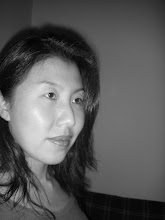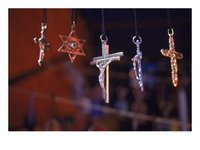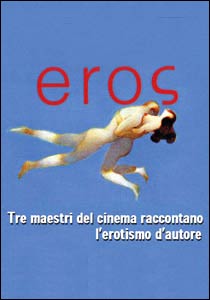22 Feb 2006
I lit my first cigarette at 2.30pm. It didn’t taste too bad. But it wasn’t very pleasurable either. Now I am feeling drowsy. The nicotine makes me drowsy and my muscles start to relax and I want to lie down in bed. It’s like a switch in my head goes off – it’s the health switch. After that first cigarette, I feel like I have undone all the good I have achieved through my Pilates, yoga and mediation in the morning. I am looking forward to becoming a non-smoker.
Fear. Where does it come from? It comes from the imagined figure watching our every move, the illusion of a tyrannical godhead that expects no less than perfection in every activity we do. We all live with a god of our own understanding, and when the understanding and perception of that god is askew, we become fearful. We believe that we only have one chance to get it right, and if that one action does not meet the approval of this imaginary god whose will we cannot accurately know, we are doomed to follow a series of failures for the rest of the day, or the rest of our lives. One chance to make that phone call about work. One chance to get that good grade. One chance to meet the right man. One chance to get married. One chance to quit smoking. One chance to be good. Only one chance at success. Believe this and the result is obvious – fear will dominate our lives.
So how do we minimize the amount of time and power that fear has in our lives? Change our perception of the godhead. Today, I see God as a comforting presence, not as a deriding or domineering authority figure. I see God as the source of comfort and rest. When I do that, my perception of people, especially people of authority change too. I stop worrying about whether or not they give me what I want or whether or not I say the ‘right’ thing. Because there is no right word or right time, or right way to get a job or fall in love or get well. There is only a good way, which fits only because all the ways that don’t fit have been eliminated. If there is no right way, then there is no wrong way, and if there is no wrong way, then we don’t have to be responsible for our failures, just as we stake no claim in our successes. When I say we are not responsible for our failures, what I mean is that we are not the hirelings of a boss-like godhead, so we do not muck up the job. Our creator does not need us to be efficient so he can pull off the job. He does that just fine without us. Our efficiency and discipline is done for selfish reasons – it benefits us and removes fear in our lives. The only reason why we perceive a thing or event as a failure is because of the amount of anxiety is stirs in us. It is a ‘failure’ because it makes us feel more negative emotions than positive ones, but the thing or event in itself is not a failure, it is simply our emotional response to it that makes it so.
With regards to emotional responses, even prolonged spells of anxiety, sadness, anger and loneliness are not entirely negative. Even fear is not entirely bad. Negative emotional states remind us that our work is not done and never will be. It makes us work all the harder at bringing forth that positive shine that comes with a clear and consistent understanding of the godhead as universal, eternal and a constant companion and friend. Another factor that contributes greatly to fear, more so than most people imagine is self-censorship. We look at a sentence again and again thinking that it is structurally, grammatically or ideologically unsound. We look for words that do not fit the sentence and think of various substitutes, we question the logic of the statement we make; we think that the tone is unauthentic. In so we as constantly looking at where we are less than excellent. How we pale in comparison to our peers or established persons in our field of work and we deride ourselves for not being as eloquent, creative or brilliant as them. We can carry this self-examination to the point of abject misery. We deride ourselves for a failure, which is not universal by any means, but is merely a conception within our minds. This failure has an audience of one. So why does this self-censoring and self-critique bring about the most anxiety? Because we are not allowing ourselves to be authentic, we are doing everything in our power, even on the most subliminal levels, like in diary writing, to project and protect our ideal selves for an imaginary audience. We seek to eradicate all thoughts and sentiments that contradict the ideal or that betray our ignorance or lack of conviction to ourselves. If we are intelligent, we are afraid that we have to admit that sometimes we are not. If we are attractive we are afraid that we have to admit that someday we will not be. If we are optimistic and happy, we are afraid that one day our confidence in positive thinking will let us down.
So how do we get around this problem? First we need to calmly accept that the godhead is good and he leaves us to get along with what we need to do. He is not a voyeur, and he meddles only to save us. Second, we need to realize that failure is only a state of mind, the reality of one, not many. Third, we need to work daily at being authentic, that means never pretending to be happier than we are or sadder or more troubled than we are. Always keep your responses true to the moment. Four, we need to ensure that we do not attach ourselves to secular or religious labels or virtues and vices. ‘I am the partner of the godhead’ is as far as I will go in convicting myself to any universal truth. Everything else, intellect, wit, humour, good looks, religious affiliation, language, gender and race is neutral and subjective. Never universal. And if it is not universal, it is not a reality per se, but a perception, and perceptions vary from one person to the next. Therefore, the concept of virtues and vices, optimism and pessimism, punishment and reward and right and wrong should have less and less of an effect on my internal balance. Even balance itself should not be regarded as a right or wrong state of mind. Good and bad exists in tandem, but it is only in this regard that I have a choice. If I choose what is good (which I will intuit only through friendship and acceptance of the godhead) I will feel less fear. If I choose what is bad (denial, resistance and usurpation of the godhead) then I will suffer fear. Secretly or openly, but without a doubt fear will reign supreme. It is only in surrendering things that sometimes seem right, that we can experience the excellent.
copyright 2006, Michele Koh
 I had just spent 2 days creating a CVS file with all the names and email addresses of people whom I would like to invite to read this blog. I spent time and effort writing a letter explaining the gist of this site. It was hard work filing, organizing and doing this database and when I finally sent the generic letter out to the 200 odd email addresses on the list, I felt a sense of achievement. But within half an hour, I received an email from one of the recipients, saying: “Michele, why the capital letters do you really want to shout?” I shrank to about 100 times my normal size. I suddenly felt ashamed and worried that I was blowing my own horn. I started going through all my postings to see if anything I wrote came across as bragging. I felt like someone had accused me of launching a self-promotion campaign. I felt like a spammer and a telemarketer, cold calling to sell my ideas and opinions.
Was I launching a self-promotion campaign? Yes. Is that wrong? No. Most artists complain that they cannot make a living or that they cannot pursue their passions and make a career out of it. They remain unknown and unhappy because their egos are so fragile that they would rather hide behind their canvases than risk being criticized or labeled a bad writer /painter/ musician. Or worse still...a bad person! Some have enough common sense to hire publicity agents and PR people. All I have done is taken the initiative to showcase my work. I am a writer and I hope that people will recognize me as one. If I am not WRITING then I how can I present myself as a writer. I am proud to be a writer. I am proud of my inclination towards the spiritual life. I am unashamed of the events in my past and my moral stand on things today. I have the right to say what I choose and if people think that is shouting, so be it. I have a big voice and I will use it.
The impact of the email was greater because the person who wrote it was someone whom I held in high esteem. Someone who appeared to be extremely intelligent, liberal, tolerant, affectionate, open-minded and kind. Certainly not someone to knock down freedom of expression. I was surprised at this person’s judgementalness.
I confided to a friend about this and she told me not to get unduly disturbed by the remark. She told me that as a writer I have to know that not everyone will agree with me and that I will encounter people who will whack me down hard. As painters and actors will know, there are more critics out there than fans. This is the first time it has occurred to me that by committing my thoughts to paper and making the decision to publish it, I have sacrificed my right to always be seen as a ‘nice person’. I have given up my right to a quiet existence of peace and goodwill. The pen is mightier than the sword. I will inevitable end up saying things that might make some people hate me. It dawned on me today that if I want to keep writing…….and writing honestly, telling the truth as I see it, it means I have to give up the privilege of being liked by everybody.
I had just spent 2 days creating a CVS file with all the names and email addresses of people whom I would like to invite to read this blog. I spent time and effort writing a letter explaining the gist of this site. It was hard work filing, organizing and doing this database and when I finally sent the generic letter out to the 200 odd email addresses on the list, I felt a sense of achievement. But within half an hour, I received an email from one of the recipients, saying: “Michele, why the capital letters do you really want to shout?” I shrank to about 100 times my normal size. I suddenly felt ashamed and worried that I was blowing my own horn. I started going through all my postings to see if anything I wrote came across as bragging. I felt like someone had accused me of launching a self-promotion campaign. I felt like a spammer and a telemarketer, cold calling to sell my ideas and opinions.
Was I launching a self-promotion campaign? Yes. Is that wrong? No. Most artists complain that they cannot make a living or that they cannot pursue their passions and make a career out of it. They remain unknown and unhappy because their egos are so fragile that they would rather hide behind their canvases than risk being criticized or labeled a bad writer /painter/ musician. Or worse still...a bad person! Some have enough common sense to hire publicity agents and PR people. All I have done is taken the initiative to showcase my work. I am a writer and I hope that people will recognize me as one. If I am not WRITING then I how can I present myself as a writer. I am proud to be a writer. I am proud of my inclination towards the spiritual life. I am unashamed of the events in my past and my moral stand on things today. I have the right to say what I choose and if people think that is shouting, so be it. I have a big voice and I will use it.
The impact of the email was greater because the person who wrote it was someone whom I held in high esteem. Someone who appeared to be extremely intelligent, liberal, tolerant, affectionate, open-minded and kind. Certainly not someone to knock down freedom of expression. I was surprised at this person’s judgementalness.
I confided to a friend about this and she told me not to get unduly disturbed by the remark. She told me that as a writer I have to know that not everyone will agree with me and that I will encounter people who will whack me down hard. As painters and actors will know, there are more critics out there than fans. This is the first time it has occurred to me that by committing my thoughts to paper and making the decision to publish it, I have sacrificed my right to always be seen as a ‘nice person’. I have given up my right to a quiet existence of peace and goodwill. The pen is mightier than the sword. I will inevitable end up saying things that might make some people hate me. It dawned on me today that if I want to keep writing…….and writing honestly, telling the truth as I see it, it means I have to give up the privilege of being liked by everybody.







